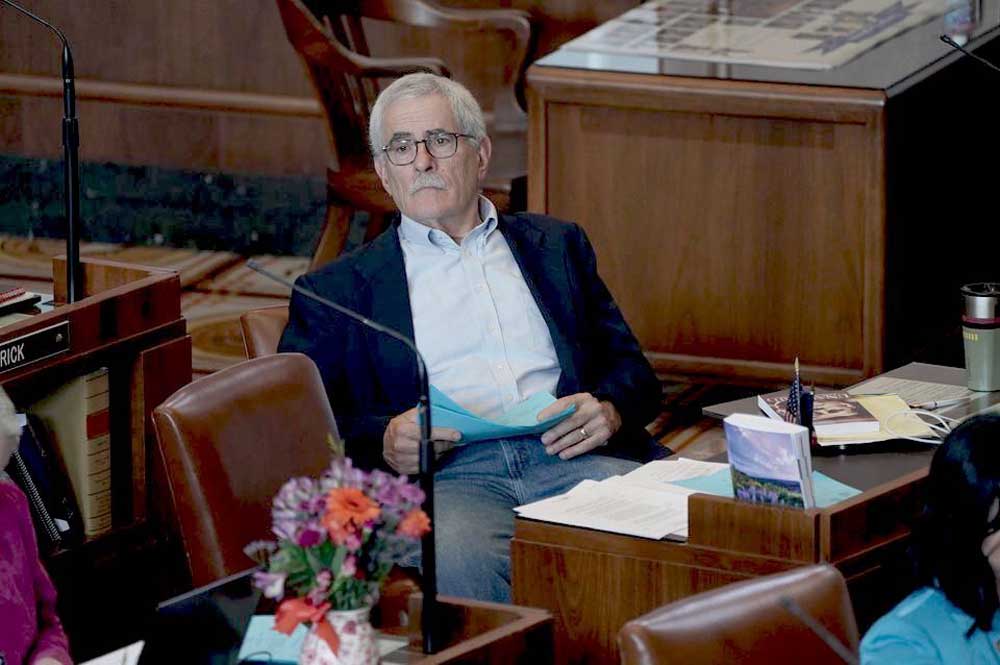Golden calls Kotek veto of bill exploring state bank formation ‘baffling, disappointing’ (copy)
Published 6:45 am Tuesday, August 15, 2023

- Sen. Jeff Golden, D-Ashland, works at his desk in the Oregon Senate chambers at the Capitol in Salem in June.
Among the seven bills vetoed recently by Oregon Gov. Tina Kotek was HB 2763, which would have created a task force to study the pros and cons of starting an Oregon state bank.
Trending
The bill, championed by state Sen. Jeff Golden of Ashland, a Democrat, was shot down by Kotek Aug. 4.
“I was proud to pass it, and I find the veto to be really disappointing and really baffling,” Golden said. “Because there’s a lot of questions. We wanted to create a task force to really examine the costs and benefits to Oregon and how well it would serve the state.”
The senator believes Kotek’s veto decision goes against her administration’s stated housing goals.
Trending
“Her stated goal is to improve housing, and to have every Oregonian secure housing,” Golden said. “For credit unions and community banks, the goal is to help homeowners, not to help investors and shareholders.”
If it wasn’t vetoed, the bill would have established a 21-member State Public Bank Task Force to explore potential benefits and harms from the proposed bank to state and local jurisdictions, look into possible governing and corporate structures of the bank, explore potential means of capitalizing the bank and studying other relevant issues identified by the task force.
The governor listed “logistical challenges” as a primary reason for vetoing the bill.
“While the governor supports exploring the creation of a state bank, this bill has several logistical challenges, including directing the Oregon Business Development Department (OBDD), which already manages over 80 programs, to manage a new task force, establish a request for proposal process and finalize a substantive report on an abbreviated timeline,” a prepared statement released by Kotek’s office said regarding the veto.
“I’m a very strong supporter of a public bank. They help working people buy homes and keep homes,” Golden said. “The track record is really impressive. I can’t understand why [Kotek] would turn back on careful examination of it.”
The only state-run bank in the United States belongs to North Dakota. The Bank of North Dakota was founded in 1919 and was established to improve access to credit in the state and promote agriculture, commerce and industry.
The state bank was formed on the belief that North Dakota’s farmers were being exploited with high interest rates in Chicago, Minneapolis, Minnesota, and other out-of-state commercial banks. Establishing a state-run bank in Oregon has been a political priority for Golden and like-minded Democrats for decades.
“There are decades of conversations and struggle about testing a public bank,” he said. “The Bank of North Dakota has always returned a surplus to the state’s general fund.”
The state-run bank saw
a record profit of $191.2
million in 2022, a $47 million increase from 2021,
according to the bank’s
2022 annual report.
“The major banks see it as taking away market share and are fighting it tooth and nail,” Golden said of HB 2763’s opponents. “Serving common people is not their top priority, return to shareholders is their top priority.”
While the bill exploring forming a state bank has been sidelined for the time being, Golden and his allies hope to return the idea to the governor’s desk in the future.
I think we can be up and running in a couple of years if we have political will to do it,” Golden said. “We’ll talk to the governor.”
Other primary sponsors included Rep. Mark Gamba, D-Milwaukie, and Rep. Jules Walters, D-West Linn.









